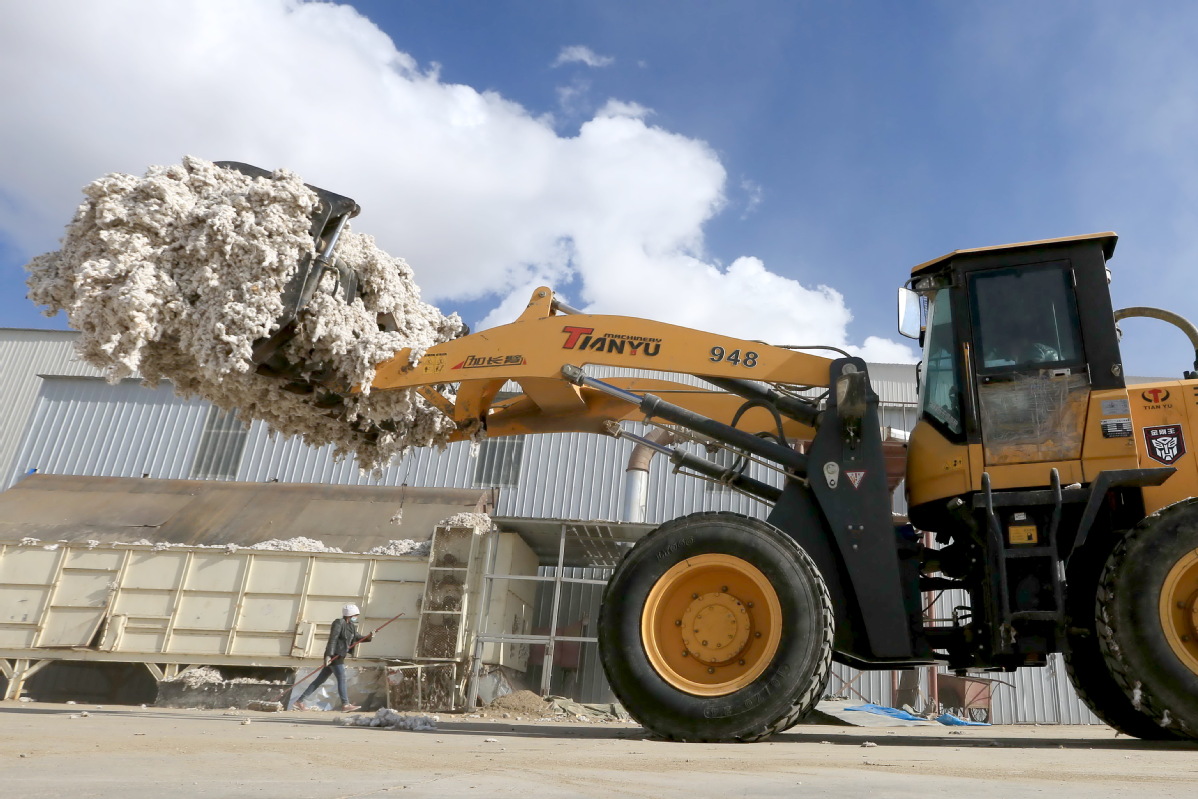West using lies to smear Xinjiang cotton
By Dai Ruijun | China Daily | Updated: 2021-04-29 07:31

Falsely accusing the Chinese authorities of using "slave labor" for picking cotton in the Xinjiang Uygur autonomous region, some Western countries have intensified their slander campaign against China and some Western garment manufacturers have boycotted Xinjiang cotton.
The Western allegations that China uses Uygur prisoners as slave laborers in Xinjiang are nothing but a depraved attempt to smear China's international image.
Using a conspiracy theory based on absurd and baseless allegations of human rights abuse in Xinjiang, some hysterical Western politicians, especially those in the United States, are keen to set up kangaroo courts to pass judgments on the Xinjiang regional government and criminalize the local government's policies, which is a blatant interference in China's internal affairs and violation of international relations norms.
To demonize the vocational training and education centers the government has established in Xinjiang especially to train youths in job skills and improve their knowledge about law so they can get decent jobs and resist the allure of terrorist and religious extremist groups, some Western media outlets have been claiming that the centers are detention camps used to repress and torture Uygur Muslim minorities, and conduct intensive surveillance against Xinjiang residents.
Some Western media outlets have even compared Xinjiang's vocational training and education centers to Nazi concentration camps in their shameless bid to malign China.
Xinjiang is key to the country's fight against terrorism, religious extremism, and separatism. The region was plagued by the "three evils" for years. In particular, for seven years since 2009, Xinjiang saw many deadly terrorist attacks and riots, which posed a severe threat to the lives and safety of the people. But thanks to the vocational training and education campaign, the region has not seen any terrorist attacks since 2017.
The hard-won social stability and peace in Xinjiang can also be attributed to the central and local governments' policies and development philosophy. In contrast to the Chinese government's efforts to counter terrorism, the US and other Western countries have established detention centers and prisons where they torture and interrogate suspects, and yet consider that to be a more humane way of countering terrorism.
On the pretext of protecting human rights in Xinjiang, the US administration even labeled genocide charges against China, and former US secretary of state Mike Pompeo claimed that China had committed crimes against humanity in Xinjiang. Such absurd statements are the result of the dirty work of far-right religious advocator Adrian Zenz, who, without any evidence, accused China of committing crimes against Uygurs and other Muslim communities in Xinjiang.
It is a pity that the governments and lawmakers of Canada, the United Kingdom and the Netherlands have passed a non-binding motion, claiming that the existence of the education and vocational training centers in Xinjiang shows the Chinese authorities have committed genocide. Their remarks reflect their vicious ideological bias.
The crime of genocide is contained in Article II of the Genocide Convention adopted by the General Assembly of the United Nations in 1948. Genocide is defined as any acts committed with intent to destroy, in whole or in part, a national, ethnical, racial or religious group.
Based on this definition, the suffering unleashed by the white colonizers on the native people of North America was an act genocide, for which even today's US and Canadian leaders and politicians can be held accountable, for they continue to follow many of their predecessors' policies.
China's preferential policies for ethnic minority groups in education, family planning and other areas have created opportunities for and promoted development among different ethnic groups in Xinjiang.
The falsehood of forced labor fabricated by the US and some other Western countries is an attempt to prompt the global textile industry to boycott Xinjiang cotton and other products.
But denying the groundless allegations, the Better Cotton Initiative's Shanghai branch said it did not find even one single case of forced labor despite its stringent inspections and third-party visits. Better Cotton Initiative is a Switzerland-based NGO that claims to promote better cotton standards in cotton farming and practices in many countries.
And an impartial statement issued by US footwear maker Skechers after careful investigation said the company had found no evidence of Chinese suppliers using forced labor in Xinjiang. But, as is expected, such impartial remarks have been ignored by the Western politicians and the Better Cotton Initiative head office in Switzerland.
Xinjiang is China's largest cotton growing base and its cotton accounts for one-fifth of the world's supply. If Xinjiang's critical position as a main cotton and tomato exporter were undermined by the US bans on these products, it would jeopardize the security of China's industrial chains and harm local residents' employment and livelihoods.
Does the US really care about the human rights situation in Xinjiang? Perhaps a video clip of retired US army colonel Lawrence Wilkerson's remarks on Xinjiang best explains the US' real intention behind smearing Xinjiang cotton. In the video, Wilkerson says the CIA could use plots and Uygurs to create unrest in Xinjiang in order to put pressure on Han Chinese and China, and eventually cause the country's collapse from the inside.
The author is a researcher at the Institute of International Law, Chinese Academy of Social Sciences. The views don't necessarily represent those of China Daily.
























